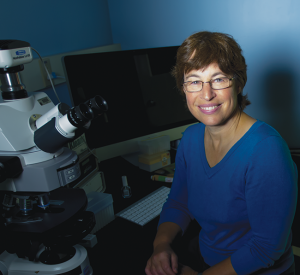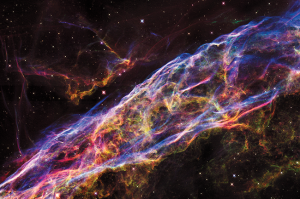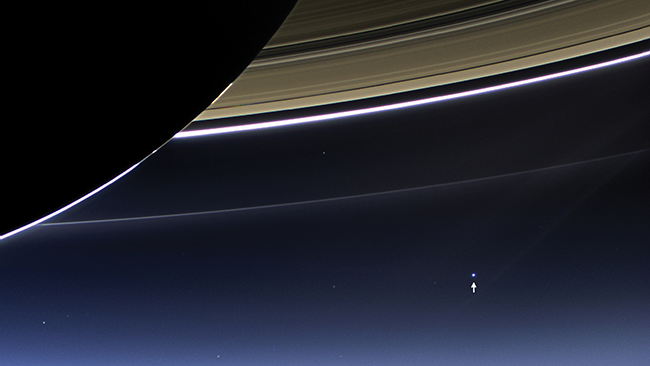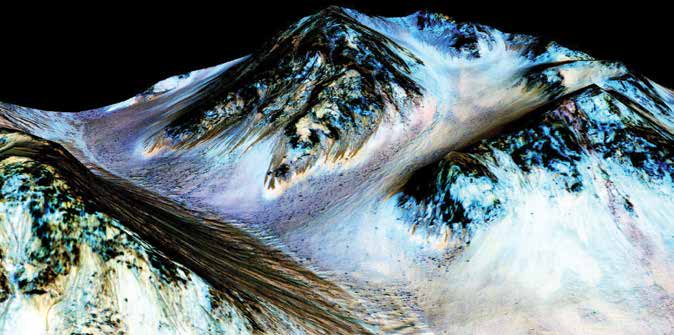Battlestar Galapagos: Where Are We Going, Where Have We Been, and Are We Alone?
 Lynn Rothschild
Lynn Rothschild LYNN ROTHSCHILD is a senior scientist at NASA’s Ames Research Center and an adjunct professor at both Brown University and the University of California Santa Cruz. In addition to publishing numerous academic papers, she co-edited Evolution on Planet Earth: The Impact of the Physical Environment (2003) and is the founding co-editor of the International Journal of Astrobiology. Rothschild travels the world lecturing and makes frequent radio and television appearances, including on National Geographic and the Discovery Channel, and on Morgan Freeman’s Through the Wormhole on the Science Channel. She is a fellow of the Linnean Society of London, a fellow of the California Academy of Sciences and the Explorers Club, and she has been honored with the Horace Mann Medal from the graduate school of Brown University.
The following is adapted from her speech in acceptance of the 2015 Isaac Asimov Science Award from the American Humanist Association at its annual conference in Denver, Colorado.
TO SAY THAT I WAS STUNNED upon learning that I would receive the Isaac Asimov Science Award from the American Humanist Association is somewhat of an understatement. After all, I’m a microbiologist—the family joke is that I always lose interest at the two-cell stage—so what I’m doing at a meeting with humans, I have no idea. In this way my being here is very much like when one travels abroad to really understand what your own home is like. And so I thought I’d talk a little bit about humanity’s place in the cosmos.
To start with, I think we really have to understand how we, as humans, got to this stage of understanding. I’d like to think that we’ve gone through several major scientific revolutions. Before Nicolaus Copernicus (what I call B.C.), people understood the earth as something very different; it wasn’t part of the heavens and it wasn’t part of the natural world. And what Copernicus did, in essence, was to put the earth into the natural world as we became the third rock from the sun.
Then you get to someone like René Descartes, and some of his buddies, who realized that our sun itself was not necessarily special—that there were other suns out there, stars just like our own.
So, at that point you had the physical world as part of the natural world. You had the earth in its place, and you had the stars in perspective. But oddly enough, the biological world was still considered something special. And then came the Darwinian revolution, and the biological world too became part of the natural world. But I would like to submit to you that that’s not the end of the revolutions, that the next stage—which may turn out to be the end, maybe not—is what I like to think of as the astrobiology revolution. This is today’s great scientific revolution because before, we were very self-centered (Where is the earth? What does our sun mean? What does life on Earth mean?) But now we need to step back and have a much greater perspective. What is the meaning in the perspective of the cosmos?

A section of the Veil Nebula revealed by NASA’s Hubble Space Telescope.
You can talk about astrobiology in terms of three big questions. First: Where do we come from? This is not just us as humans, but life as a whole. And beyond that, how do you end up with the sort of chemicals that can form life? Going back even further, how do you even have a habitable body? A solar system? And all the way back to the Big Bang. So it’s really evolution writ large.
The flip side is the second big question in astrobiology: Where are we going? Just because we’re here on planet Earth doesn’t mean that the sun has stopped burning. It doesn’t mean that the moon has stopped receding from our planet at about four centimeters a year (we know from the Apollo missions that it is). Things are going to happen in the future. The big difference is that we will be here, and we will have an influence on it. We’re already having some influence on our climate (nothing compared to what the algae have done before us creating a 21 percent oxygen atmosphere; you want something powerful, you turn to the algae). But, nonetheless, we do have a big impact on the earth, and I have great faith—because I have to—that our descendants will be doing phenomenal things, whether it’s resetting the sun so we don’t just get lost as it becomes a red giant, or whether it’s moving planet Earth, or the moon, or settling elsewhere and so on.
The last big question, which everyone loves, is: Are we alone? And that’s what helps to give us our view of ourselves. It doesn’t matter if it is a microbe or intelligent life. We have excellent evolutionary theory working out how a microbe can evolve into a multicellular and even sentient being, really an embarrassment of riches. And, you should know, that the SETI (Search for Extraterrestrial Intelligence) community defines “intelligence” as the ability to build a radio transmitter. With that definition, how many of us would qualify as “intelligent”? Certainly not me! The big question that we have yet to solve is how to go from intimate material to that thing we call “life.”
I would argue that once you get past the questions of what’s for dinner and how you make babies, astrobiology articulates humankind’s greatest, most profound questions: Where do we come from? Where are we going? And are we alone? (I like to summarize it all as “Battlestar Galapagos.”) But now is the first time in human history that we can approach these scientifically. This is because we now know so much more about planets and stars outside of our own solar system.
Molecular evolution has exploded in the last thirty or forty years. When I was in graduate school we’d sit around on a Friday night talking and hypothesizing about the relationship between different microbes, and at the end of dinner someone would say, “yes, but we’ll never know for sure.” Now we can go in at the molecular level and we do know with some sort of certainty. And in the sort of work I do—life in extreme environments—we’re at a stage now where we have spacecraft on Mars taking selfies. Our robotic surrogates have gone to all these places in our solar system and beyond and looked back at us. We have gained this perspective of space.
Incidentally, a good friend, Rusty Schweickart, was the pilot on Apollo 9 for the lunar module, and he was the first human to be sitting out there tethered to the spacecraft, looking back at the earth realizing what a beautiful, fragile planet we have, a sentiment echoed by subsequent astronauts. I’m frequently asked which planet is my favorite. I don’t know what they’re expecting me to say—the moon Enceladus? It’s Planet Earth; our home. A beautiful green and blue watery world where every creature and everyone we ever knew lived, and all humankind’s greatest achievements were born.
Someday we’ll have to send humans to colonize the moon, Mars, and beyond, and they will start to think of Earth as the homeland of their ancestors, a data-processing center in the sky, and later maybe something almost mythological. Maybe on one’s birthday the gift will be a coloring book of Earth or maybe a trip there. But the significance of Earth will be receding. It will always be our origin, but perhaps no longer our homeland.
Looking at some recent, stunning photographs from the Cassini orbiter, what you see is obviously Saturn, but what you may not notice is a little tiny dot, which is Earth—everyone you know, everyone you have ever known, everything that has happened in human history is on that little tiny dot. And then you look at a Hubble picture and imagine that we’re an insignificant little pixel somewhere, if even that much in the grand cosmos. I mention this not to make us feel insignificant. No, indeed, we’re part of this enormous family of molecules, of matter and energy. We are part of the most grand club of them all, the universe.

Dubbed “The Day the Earth Smiled,” this image was taken on July 19, 2013, by NASA’s Cassini spacecraft and shows Saturn’s rings, but also (as indicated by the arrow) planet Earth.
Let’s switch for a second to our place in time; that’s something that’s slightly more transcribed. Of course, we need to start in the beginning at the Big Bang, which wasn’t actually all that long ago—13.8 billion years. That seems, to me at least, a little more tractable than discussing the question of space, which is so vast and continuing to expand. So you have the beginning, but we’re on a planet that isn’t nearly that old—we were only born about 4.5682 billion years ago. Of course, a lot’s happened since then, including a lot of evolution.
But there’s so much we don’t know. We don’t know how long it took for life to originate. We don’t even know how life originated. We’re working on some of that in my lab, but even if we created life tomorrow, that doesn’t prove that that’s how life originated on planet Earth. There may be a point where we realize that determining how long it took for life to originate is some sort of computational chemistry problem. Maybe it’s something really trivial, and we just don’t know what the last step is. Or maybe it’s something that is indeed very special, and in fact we are very special. Again, we just don’t know, and even if we did— think about it—planet Earth is one example. It would be like me saying I read one of Isaac Asimov’s books and therefore I know everything about every book ever written on planet Earth. That’s ridiculous; I would have one example. Likewise, for us to be so arrogant as to say, we know about life on Earth, therefore we know about Life, in a capital sense, would be absurd.
More than that, we as human beings are an amalgamation of all sorts of processes going on at very different time scales simultaneously; we’re an integration of them all. Molecular processes occur at the sub-second level—the second, minute, hour…(you may imagine this speech is on the day or year scale; it’s actually on the minute scale). Go back millions of years, you can get back to the last great mass extinction. Billions of years—we’re starting to talk about the evolution of the earth and the solar system as a whole. But we can’t possibly imagine most of those time scales, not really. I get paid to talk about billions of years. Likewise, I get paid to talk about nanoseconds, about the vastness of the cosmos. But the human mind cannot understand that. The time scale that we as humans can understand is zero to one hundred years or so. That’s about it. Now, maybe if we were a plant we’d have a different perspective. For example, you’ve got plants that live six weeks, and then you have Quaking Aspen colonies that live 80,000 years.
Can we actually circumvent some of these time issues? With some of today’s technology we can. Over the last six years, I’ve started a program in synthetic biology for NASA. This is something that’s been very important to the White House, it has gained enormous speed internationally, and it’s something that has enormous potential to work for the betterment of humankind. Of course, I’m not as involved in the betterment of humankind as I am in looking to what we can do off-planet, but in a roundabout way it is to that end. We have a lot of potential for biofuels, for pharmaceuticals, and so on concerning human settlement, but once we start mixing around genes we can also do a lot to study evolution, study our past, and study our future.
I am the faculty advisor for a combined group of Stanford and Brown students in a molecular biology competition (the iGEM—International Genetically Engineered Machine—competition), and one group of my students in 2012 had this great project where they were specifically going out to make artificial extremophiles. They called it the “Hell Cell,” which got laughs and admiration all the way up and down Pennsylvania Avenue. Be that as it may, it’s a very interesting perspective circumventing some of these time issues. And before I get someone upset about tinkering with evolution and so on, keep in mind there is nothing that you ate tonight that hasn’t been bred by humans. Everything you ate is domesticated, whether it was the wheat, or the grapes, or the chicken, or whatever. This is just a different strategy; it’s not different in kind as it is the result of humans changing the genome, the very information content of life.
So we go back to looking at our solar system and ask: Are there places that potentially have life? NASA tends to use the strategy of looking for water, and so we have Venus, which used to be much more like Earth until it started to heat up. A run-away greenhouse is a perfect lesson for us, because water’s a greenhouse gas. And so we think it’s quite possible that there could’ve been life on the surface of Venus that possibly arose at the same time it arose on Earth.
As Venus got hotter and hotter, the life potentially went into the clouds, and that’s another project we’re approaching with synthetic biology. Earth, we know, is contaminated with life. Mars is relatively close to Earth, and so maybe we’ll find something that’s Martian, but it may be a whole lot quicker on Mars. Or Ceres, which is the largest object in the asteroid belt and which we think has liquid water. Or Europa, or even Ganymede (moons of Jupiter); or Enceladus, one of the moons of Saturn, which is an ice-covered moon with liquid water; or Titan, which is like a frozen chemistry experiment, and on, and on, and on. The New Horizons mission data has even suggested that Pluto—you remember the former planet?—could conceivably be an abode for life.

Recurring “Lineae” on the slopes at Hale Crater Mars. On September 28, 2015, NASA scientists announced the discovery of recent water stains in canyons on Mars, raising the chances that the red planet is habitable.
Then again, maybe we’ll find places there that are close to the environments of life on Earth, and when I say maybe we will, I mean we have—that’s beyond question. So instead of saying, oh, darn it—if it were only five degrees warmer we could put this organism there, we go to the lab and say, let’s see if we can split the difference. Let’s see if we can tweak Earth life, which doesn’t then mean that we have this life on Enceladus or wherever, but it tells us what’s possible. Because if I have something in a test-tube that can live on Enceladus, it means it is habitable. It doesn’t mean that we know what’s there, or that there’s anything there—all it does is tell us it’s possible, and that’s huge in itself.
The mission that we’re very proud of at NASA Ames is the Kepler mission, which has specifically been out there to look for Earth-like planets. It’s a satellite that’s now on a secondary mission, but its primary mission was to stare at 150,000 planets without blinking. And by doing that, and looking for slight diminutions in light level, it’s found this enormous number of extra-solar planets—not just the planets, solar systems. This is absolutely incredible.
Maybe someday we’ll make life de novo in the lab. But the fact is that we really know so little about time, about space. When I first got to NASA at the end of 1987 I thought, they only have one solar system. They have to wait for someone to pay for another mission to get any data, so with one known solar system and one known form of life they were really on the slow track.
We still only have one known life form, but as of August 25, 2015, we’ve confirmed about 1949 planets, 487 multiplanetary systems, and far more candidate planets from Kepler and other sources. Can you imagine if I said instead, “We have 1,949 confirmed examples of different life forms. And it turns out that 73 percent of them do this, and 22 percent do that, and out of that maybe 64 percent have humanist societies.” Even if we had two life forms, it would be phenomenal! But we’re probably closer to making life then finding it.
Let me end more on a philosophical note. What if, after all this searching through time and space for other life forms, we don’t have any examples? If so, we’d have to face the reality that we are alone. That will never happen within our lifetime. We may find another life form within our lifetime, but we’ll never be able to say conclusively that there are no other life forms. So this is going to be something for our descendants to think about: If it’s true that we are indeed special, is this maybe something that’s a reversal of this last revolution? With all these revolutions that I started with—making us seemingly more insignificant—maybe it turns out that we are it. This would have huge moral and ethical implications, potentially huge religious implications, and environmental implications. Are we then responsible for keeping the rest of the universe and our solar system in order? We have a working principle that the origin of life happens when you have certain physical chemical conditions. We would have to rethink all that, because we know those conditions are out there.
If I could finish with a little Darwin:
It is interesting to contemplate an entangled bank, clothed with many plants of many kinds, with birds singing on the bushes, with various insects flitting about, and with worms crawling through the damp earth, and to reflect that these elaborately constructed forms, so different from each other, and dependent on each other in so complex a manner, have all been produced by laws acting around us… There is grandeur in this view of life, with its several powers, having been originally breathed into a few forms or into one; and that, whilst this planet has gone cycling on according to the fixed law of gravity, from so simple a beginning endless forms most beautiful and most wonderful have been, and are being, evolved.
That is about as beautiful a vision of the world as I could possibly imagine, except to add: imagine you are talking about that wherever the conditions are right.
People sometimes ask me why I do what I do. There is poverty in the world, certainly; there are other sorts of problems in the world. So, why should I be taking the time and energy and taxpayer money to go out and look for life elsewhere? Once, on a fieldtrip in the Rift valleys in Kenya I went into a couple of the schools with a colleague of mine, and one of the schools was outside in Nairobi, in the slums. This school had a corrugated roof and when it started to rain, you couldn’t hear. I’ll be very blunt: it smelled of urine. There were chalkboards and kids crammed onto benches—two-thirds of these kids were orphans, and yet they came to talk with me on a day that wasn’t even a school day. We went through the planets. We talked about whether there could be life on Mercury, if there could be life on Venus. And when I got past Earth I asked, “what’s the planet beyond Earth?” One little boy jumped up and down, calling, “Teacher, teacher, teacher, I know! It’s Jupiter!” And these kids, who had virtually nothing that we in America would consider material goods, just looked at him like, are you an idiot? It’s Mars, of course!
To me, the really stunning part was the lesson that there is much more to being human than having a well-fed stomach; that being human is part of the whole sense of exploration. Our ancestors were explorers, or they wouldn’t have moved into the various continents as they did. This is the DNA we inherited. Every child is born a scientist, every child has a sense of curiosity, a sense of wonder, and, I would argue, a sense of awe about the world. To me that’s what makes us human.
With that, I’ll say “ad astra,” which means “to the stars.” And again, I’m very honored to receive this award. Thank you very much.
